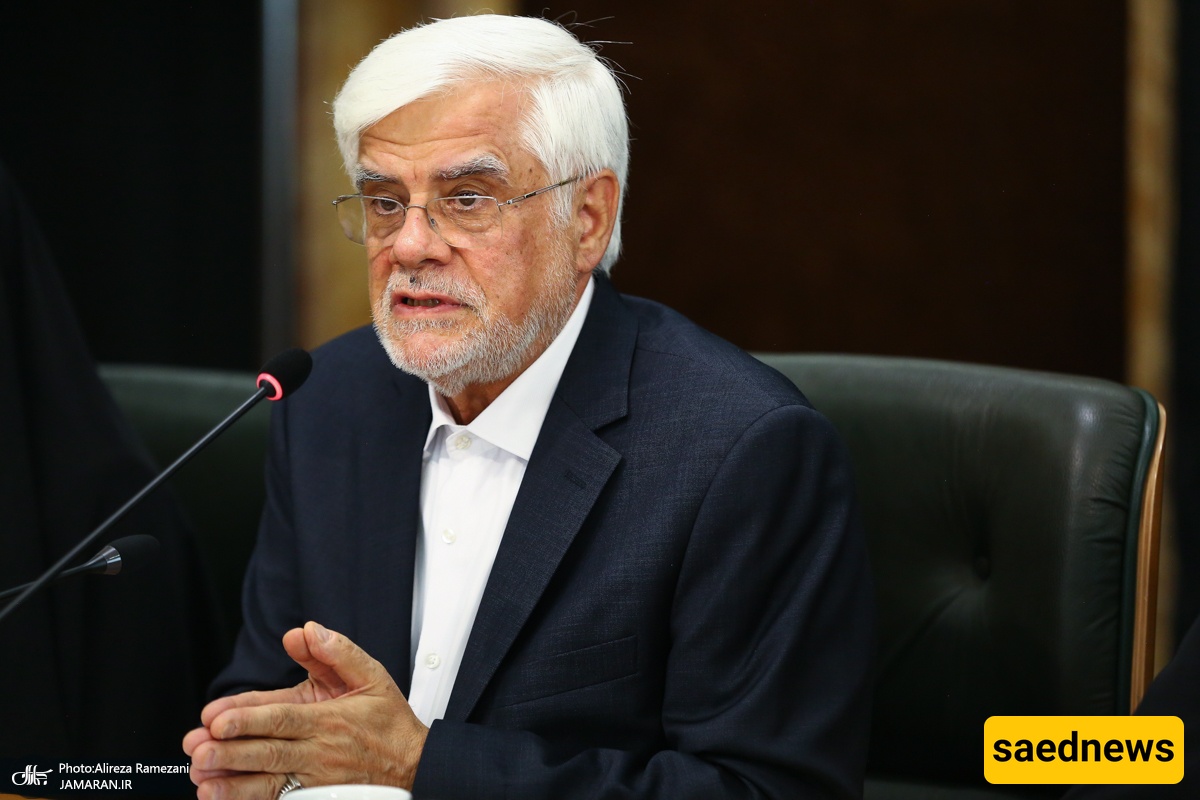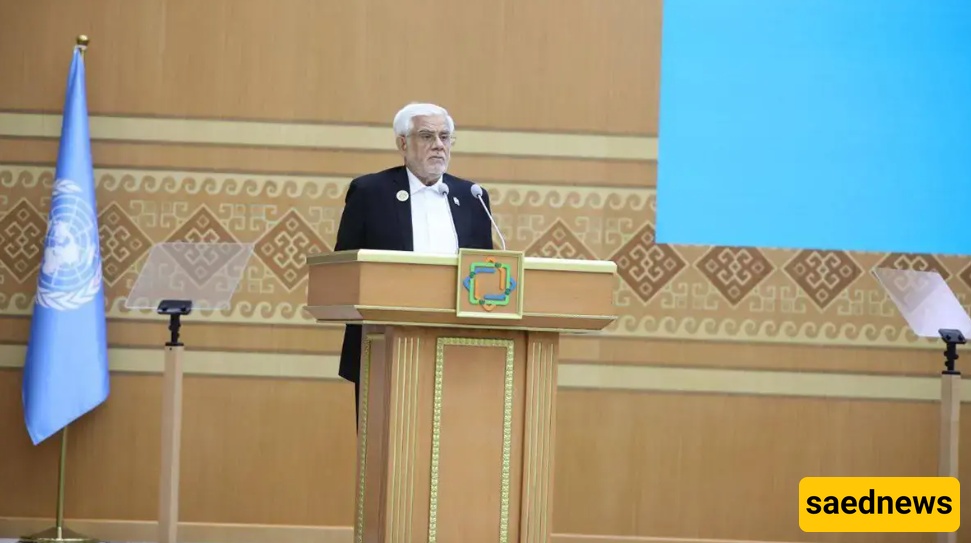SAEDNEWS: Iran’s First Vice President, Dr. Mohammad Reza Aref, underscored Iran’s growing transit capacity and regional cooperation efforts at the UN Conference on Landlocked Developing Countries, while condemning Israeli attacks on Iran and calling for collective international action to break Gaza’s blockade and uphold human rights.

Deputy First President of the Islamic Republic of Iran emphasized the country’s transportation capacity, reaching a record of 20 million tons of transit cargo. He underscored that Iran’s approach to regional and international communications is based on interaction, cooperation, and avoiding competition. He highlighted the importance of regional cooperation through multilateral organizations and agreements to develop transport and transit networks. Iran, by expanding its transport infrastructure, has provided neighboring countries with opportunities to facilitate trade, economic development, access global markets, and achieve sustainable growth.

Dr. Mohammad Reza Aref spoke today (Tuesday) at the Third United Nations Conference on Landlocked Developing Countries held in Awaza, Turkmenistan, in the presence of the UN Secretary-General and officials from various countries. Referring to the Israeli regime’s attacks on Iran, he stressed that the United States, by supporting Israel and even directly intervening in attacks on Iran’s peaceful nuclear facilities, destroyed the negotiation table and reaffirmed global distrust toward US commitments.
He stated: “The Islamic Republic of Iran has never initiated war but fully confronts any aggression, defending its territorial integrity. It seeks to compensate for the material and moral damages inflicted by the Israeli regime and the US on its people and development infrastructure.”
The Deputy First President also referred to Israeli crimes in Gaza, the most besieged area on earth, calling the attacks on hungry civilians awaiting bread, water, and humanitarian aid a clear war crime and crime against humanity. He urged the international community and human rights advocates to be accountable for the bloodshed of thousands of innocent people trapped in deadly US-Israel ambushes at aid distribution centers, and for the deaths of hundreds of children, women, and elderly due to shortages of medicine, food, and water in Gaza.
Full speech text:
In the name of God, the Compassionate, the Merciful,
Mr. Serdar Berdimuhamedov, Honorable President of Turkmenistan,
Mr. António Guterres, Honorable Secretary-General of the United Nations,
Distinguished attendees,
Ladies and Gentlemen,
First, I would like to thank the government and people of Turkmenistan for their hospitality and for organizing this important international conference. Today, I participate on behalf of the peaceful and resilient people of the Islamic Republic of Iran.
On the early morning of June 13, 2025, the unlawful Zionist regime, supported by the United States, launched a military aggression against the Islamic Republic of Iran. Over 12 days of illegal military aggression, 1,100 people lost their lives, including 45 children and 132 women, with 5,750 injured. This cruel act was condemned by many countries and regional organizations; however, some nations supported the aggressor and Israel’s dirty actions instead of condemning them.
The United States, by supporting the Israeli regime and even directly intervening in the attacks on Iran’s peaceful nuclear centers while the sixth round of Iran-US negotiations was being planned, destroyed the negotiation table and once again confirmed global distrust in America’s promises.
The Islamic Republic of Iran has never been the initiator of war, but it fully confronts any aggressor, defends its territorial integrity, and pursues compensation for the material and moral damages caused by Israel and the United States to its people and development infrastructure. Iran pursues these claims through international legal and judicial authorities.
Ladies and Gentlemen,
One-quarter of the 32 landlocked developing countries worldwide—eight countries including Afghanistan, Armenia, Azerbaijan, Kazakhstan, Kyrgyzstan, Tajikistan, Turkmenistan, and Uzbekistan—maintain close bilateral and multilateral transit relations with the Islamic Republic of Iran.
Iran’s access to open waters and its proximity to many landlocked countries provide valuable mutual opportunities. The long-standing shared cultural and civilizational heritage has fostered solidarity and integration among the peoples of the region. For centuries, these peoples have maintained extensive economic, commercial, cultural exchanges and peaceful coexistence.
Iran and other transit countries in the region bear part of the international community’s responsibility to reduce the vulnerabilities of landlocked developing countries by helping lower trade costs and providing easier access to global markets.
The Islamic Republic of Iran, by developing its transport infrastructure, has created a platform to enable neighboring countries to utilize this capacity to facilitate trade, economic development, global market access, and sustainable growth.
Iran plays a strategic and pivotal transit role connecting the three large continents of Asia, Africa, and Europe. Its unique geographic position offers opportunities for landlocked countries in the region to access open seas and expand their trade. Strengthening transit corridors through Iran—north to south and east to west—has been a development priority, with extensive transport capacities prepared.
With investments made, Iran’s transport capacity now includes a 15,000 km railway network, over 250,000 km of roads, 16 commercial sea ports in the north and south, more than 167 customs centers, and over 54 commercial airports, ready for cooperation with regional neighbors and landlocked countries. Iran welcomes both joint and independent foreign investment in this sector.
Dear attendees,
Regional and international cooperation alongside these capacities offers vast opportunities for transport and transit development. Expanding border collaborations and joint investments will leapfrog transit and increase regional interdependencies, leading to development and collective security for all.
Last year, Iran achieved a record of 20 million tons of transit cargo—a success resulting from close cooperation with regional countries. Iran has accelerated and simplified transit by implementing digital management and electronic exchange of transport documents. Customs cooperation and reducing procedural delays have also been emphasized. Preparing a roadmap for transport cooperation with regional landlocked countries is another measure aimed at strengthening this collaboration.
Mr. President,
Fortunately, in international forums, Iran and Turkmenistan maintain good cooperation to strengthen peace, stability, and sustainable development in the region. Iran supports Turkmenistan’s neutrality policy, which can effectively help it resolve regional and international conflicts.
Iran’s access to open waters through the Persian Gulf, Oman Sea, and Indian Ocean, and Turkmenistan’s position as the gateway to Central Asia and the Caucasus, plays a vital role in transit of goods and energy for landlocked countries. Transit ports such as Chabahar and Bandar Abbas, and international road and rail corridors connecting north to south and east to west, enable these countries’ access to global markets. Iran is ready to establish logistics and transit centers for these countries in its southern ports.
Through multilateral cooperation frameworks such as ECO, Ashgabat Agreement, Eurasian Economic Union, Shanghai Cooperation Organization, and other regional and international agreements, Iran strives to assist Central Asian and Caucasus countries in creating favorable conditions for sustainable development in transport.
Iran’s perspective on regional and international communications is founded on interaction, partnership, and avoidance of any competition. This approach aligns with the spirit of the Vienna and Awaza Program of Action concerning landlocked developing countries.
Honorable delegations,
Global challenges are interconnected, and countries with varying levels of development cannot address them alone. Solutions require collective, regional, and international cooperation. Multilateralism is a fundamental principle in international relations and essential for achieving shared human goals. Iran emphasizes the importance of multilateralism and considers unilateral sanctions and coercive measures as obstacles to nations’ right to development, applauding independent countries that refuse to support such illegal and anti-human rights actions.
Distinguished ladies and gentlemen,
In conclusion, I wish to mention the most besieged place on earth: the Gaza Strip. Gaza remains a symbol of resistance and victimhood, a fact proven anew by the astonishing resilience of its men, women, and children amid the past 22 months of crimes by the Zionist terrorist regime.
During this period, the criminals have used every tool, including shamelessly imposing forced hunger and thirst on the defenseless people of Gaza, but have failed to break their iron will.
Attacking hungry crowds waiting for a piece of bread, a sip of water, and humanitarian aid is a blatant war crime and a crime against humanity.
The international community and human rights advocates must be accountable for the bloodshed of thousands of innocent people trapped in death traps set by the US and the Zionist regime at aid distribution centers, and for the deaths of hundreds of children, women, and elderly due to shortages of medicine, food, and water in Gaza.
History and conscious humanity will rightly judge this inaction. Collective action to break the blockade on Gaza must be taken today before it is too late.

